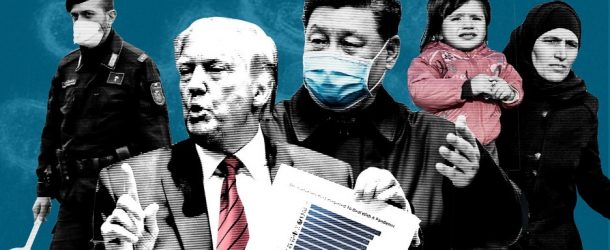Coronavirus epidemic has literally stopped the world economy and all diplomatic, cultural, and sports activities in the last few weeks. According to World Health Organization (WHO), the coronavirus is a pandemic and sustains the risk of further global spread[1]. That is why; it seems very rational to obey the advice of doctors (especially for elderly people who are more prone to suffer deadly consequences of the disease) and to stay at home for a time in order to wait the disease to be contained. Leaving aside conspiracy theories, coronavirus has reminded us how the global economy is fragile. Moreover, this disastrous contagion might have some political consequences as well.
First of all, the coronavirus has proved once again that, in the age of globalization, it is almost impossible not to be affected from things that are happening in other countries. As everyone knows, the disease started in Chinese city of Wuhan and spread to almost all countries in the world in a relatively short period of time. Political implications of this, however, could be in two different ways. One way is trying to reverse the globalization trend and increase the safety measures (border controls, limitations on international trade and transportation etc.) with an effort to return to nation-states. This might provide some success to the states in the beginning process as pandemics could be more comfortably defeated when foreign influence is cut and countries could be turned into quarantine zones. However, in the medium and long run, anti-globalist precautions would not only negatively affect the economic performance of states, but also risk the cooperation among countries in terms of science, health, sports etc. through which countries enjoy new opportunities and technologies taken from other states. That is why; the second option, a better globalization might be the necessary cure for the coronavirus as well as other global problems. It is a fact that the globalization created winners and losers. Inequalities in terms of life standards of rich and poor nations further increased over the last few decades. Moreover, we have seen during the Arab Spring that the insistence on democracy can lead to more severe problems in case countries at stake have more important imminent problems. So, a better globalization can be created via the United Nations (UN) and other global organizations’ initiatives to constitute funds for global problems. The problem of international refugees, pandemics, civil wars, wars, terrorism and other source of global problems can only be defeated with the cooperation between different states and nations. This would never mean that all countries will solve their problems with other states instantly; however, at least they will agree on cooperation in certain issues and necessary funds would be available for improving the life standards of people who are in difficult conditions.
Secondly, coronavirus has shown us that countries will have to reserve higher budgets on health services and research and development departments in order to be ready for global pandemics. Unfortunately, many countries in the world prefer to invest in armament technologies rather than health researches. However, unlike what they think, security risks do not only arise from terrorist groups or other states, but also from global diseases. Thus, in order to provide safety to their citizens, countries have to assess health and education equally strategic industries as the military services.
Thirdly, coronavirus has proven that human lives are more precious than anything else and countries might solve their “big” political problems in case they understand this basic reality. For instance, American economic sanctions against Islamic Republic of Iran seem cruel when thousands of Iranians are dying because of coronavirus and they are in urgent need of medicaments and tests. However, political prejudices are both sided since Iranian Supreme Leader Ayatollah Ali Khamenei refused the U.S. help[2]. But unlike Iran and the United States, many states might turn this crisis into an opportunity to establish links and to reduce hostile feelings towards each other.
Fourthly, although the market economy’s advantages can never be ignored, it is a fact that we still need strong social states that will be ready for emergency situations. Especially in the developing world where the per capita income level is often low, we need good state hospitals and developed health services.
Lastly, it is absolutely necessary to realize that Social Darwinism is not an option in the 21st century and we need to protect elderly and sick people as much as we can in order not to lose our humanity and turn into barbarism.
Finally, I think we need to work together to create a better world and a fairer globalization through strengthening international organizations and the existing global order. We can achieve this only if elites of countries (statesmen, academics, doctors, military leaders, business leaders etc.) could establish strong bonds with each other and try to act in a benevolent way to serve not only the national interests of their countries, but also global interests.
Dr. Ozan ÖRMECİ
[1] https://time.com/5791661/who-coronavirus-pandemic-declaration/.
[2] https://www.aljazeera.com/news/2020/03/iran-leader-refuses-cites-coronavirus-conspiracy-theory-200322145122752.html.

























































One Comment »